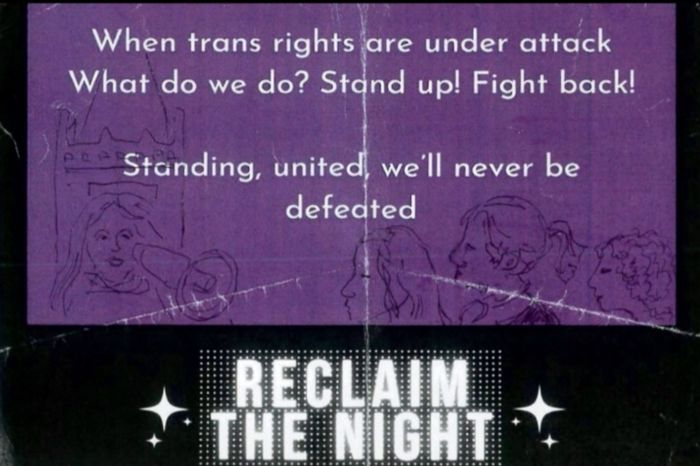Cambridge has its own toxic masculinity
Daisy Stewart Henderson argues that the national discussion on toxic masculinity must not continue to overlook the bad behaviour of privileged men

The school I went to in Glasgow is probably of the type that would be raised in debates on the impact of toxic masculinity on boys. Parts of its catchment area are highly deprived and there are issues with students’ behaviour. The city’s football rivalry, notorious for its association with sectarian violence, remains ever-present. The prevailing culture for young men is undoubtedly a highly macho one.
I’m thankful that I wasn’t a boy in that environment. But even so, I have witnessed far more overt misogyny at Cambridge.
In conversations about toxic masculinity with Cambridge students, a few key themes tend to emerge. There’s an assumption that the young boys most prone to it come from impoverished backgrounds, where there is nothing better for them to do than watch hateful content online. Perhaps they live in broken homes, with fathers who are themselves misogynists. Football seems to come up again and again.
These are all valid points. But, coming from those at a university where a disproportionately small number of students have backgrounds like this, they have the effect of kicking the can down the road. We risk rendering toxic masculinity solely a class issue. The middle class intellectual poster child of a male Cambridge student is rendered immune. We are quietly asserting that misogyny and harmful male behaviours are just not our problem.
“We are quietly asserting that misogyny and harmful male behaviours are just not our problem”
We’re quite rightly willing to address the toxic masculinity that abounds from binge drinking fuelled lads culture in settings such as football games. But why aren’t we talking about all-male drinking societies at Oxford and Cambridge, where admission may be contingent on partaking in some debauched initiation, or how many women a man has slept with? What of the notoriously bad behaviour of sports societies that seems to recur again and again? In the debate about the presence of toxic masculinity in schools, where is the discourse on the unique phenomenon that is all-boys schools? What of the impacts of attending boarding schools, in which male abuse has a notorious precedent on young boys?
Surely it isn’t the case that a boy’s school won’t expose him to misogyny just because his parents pay fees for him to attend it. Social media, which we all acknowledge has so much to answer for here, is ubiquitous among teenage boys. The upper and middle classes cannot opt out of the toxic masculinity debate, even if they’re the ones writing the articles about it and debating it in parliament.
“Maybe it’s time to acknowledge that wearing a quarter zip rather than a football shirt doesn’t render a man immune from misogyny”
Though I, for obvious reasons, didn’t attend an all-boys boarding school, studying at Trinity College, which is 70% male and home to many an alumnus of such schools, may be as close as I can ever come. Toxic masculinity certainly has a presence, but it looks different to what you might see at a football game in Glasgow. It’s inextricably linked to privilege and a belief in one’s own superiority, instilled in boys from an early age.
It looks like young men mocking female academics, or talking over their female peers in supervisions, or seeking out drunken freshers as the targets of their advances. From the mundane to the extreme, it tends to be directly correlated with entitlement, creating a distinctive strain of male bad behaviour. We’ve certainly paid the price for it, through years of allowing a Bullingdon Club culture to thrive in Downing Street. And yet we still struggle to talk about privileged toxic masculinity and its roots in specific school and university environments.
Netflix’s Adolescence has drawn attention to a harrowingly extreme variant of toxic masculinity. But it would be complacent for anyone to assume immunity from the phenomenon in some form or another. We have established that the issue starts young, and that it is more-or-less endemic in our society. However, a lack of introspection remains among some sections of this society who, one can only assume, consider themselves too clever, or too well-raised, to be misogynists. We acknowledge the importance of diverse role models for young boys, for example. But the specific role they can play for boys brought up in educational environments that are exclusive by design remains an important yet unanswered question.
Maybe it’s time to acknowledge that wearing a quarter zip rather than a football shirt doesn’t render a man immune from misogyny. Atrocious as online trends are, the attention they have drawn to the issue of toxic masculinity should highlight its engrained presence in our society, rather than framing it as a new import. This is a moment for all men to reckon with misogyny, yet it risks creating a new way of passing the buck.
Want to share your thoughts on this article? Send us a letter to letters@varsity.co.uk or by using this form.
 News / Candidates clash over Chancellorship25 April 2025
News / Candidates clash over Chancellorship25 April 2025 Interviews / Dr Ally Louks on going viral for all the wrong reasons25 April 2025
Interviews / Dr Ally Louks on going viral for all the wrong reasons25 April 2025 Music / The pipes are calling: the life of a Cambridge Organ Scholar25 April 2025
Music / The pipes are calling: the life of a Cambridge Organ Scholar25 April 2025 News / Cambridge professor paid over $1 million for FBI intel since 199125 April 2025
News / Cambridge professor paid over $1 million for FBI intel since 199125 April 2025 Arts / Plays and playing truant: Stephen Fry’s Cambridge25 April 2025
Arts / Plays and playing truant: Stephen Fry’s Cambridge25 April 2025






